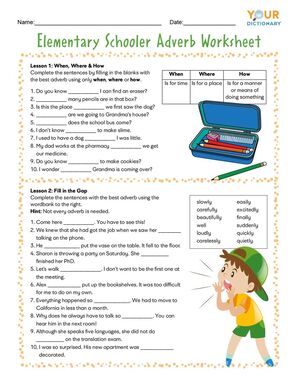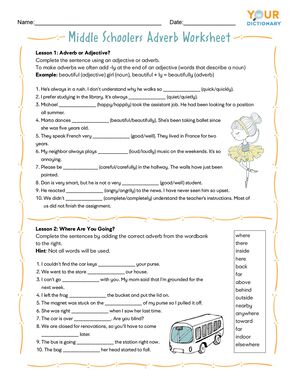

Are you looking for an easy way to help your learners with adverbs? Worksheets to help master this skill can work to advance your students’ thinking and understanding of adverbs. Rather than making your own, use the several different adverb worksheets for elementary and middle school learners provided here. And, you’ll also find ideas for how to use them and beyond.
Teaching Adverbs to Students
Before throwing adverb worksheets at your students or kiddos, you’ll want to give them an overview of what an adverb is. In short, adverbs are words that describe or modify verbs and sometimes adjectives and other adverbs. They often answer the questions of how, where and when.
It’s also pivotal to show students that adverbs can strengthen or weaken writing. To do this, you’ll want to provide them with a few good examples like:
Even after one year of lessons, Luke plays the piano badly.
"Badly" is an adverb that modifies the verb "play" and tells us how Luke plays the piano.
The class is unbelievably difficult. Many students don't pass it.
"Unbelievably" is an adverb that modifies the adjective "difficult" and tells us how difficult the class is. It’s actually unbelievable.
Now let's get some practice using adverbs!
Adverb Worksheets for Elementary Students
Elementary students are just getting a grasp on using adverbs. Therefore, their worksheets need to be a bit easier. It can also be fun to make them into a game.
Where, When & How
Learning how to use when, where and how is a good skill for your elementary school students. In this adverb worksheet, they will fill in the blanks with “when,” “where” or “how.”
- Do you know ____________ I can find an eraser?
- ____________ many pencils are in that box?
- Is this the place ____________ we first saw the dog?
- ____________ are we going to Grandma’s house?
- ____________ does the school bus come?
- I don’t know ____________ to make slime.
- I used to have a dog ____________ I was little.
- My dad works at the pharmacy ____________ we get our medicine.
- Do you know ____________ to make cookies?
- I wonder ____________ Grandma is coming over?
Once your learners have a solid understanding of using the words when, where and how, you can challenge them to make up their own sentences using the words. Extra points for getting really creative with it.
Fill in the Gap
For this worksheet, you’re going to fill in the blanks using different adverbs. The answers can be found in the PDF worksheet.
The suggested list of adverbs (not all adverb is needed) includes: slowly carefully beautifully well loudly carelessly easily excitedly finally suddenly quickly quietly
- Come here ____________. You have to see this!
- We knew that she had got the job when we saw her _________ talking on the phone.
- He ______________ put the vase on the table. It fell to the floor.
- Sharon is throwing a party on Saturday. She ___________ finished her PhD.
- Let's walk ________________. I don't want to be the first one at the meeting.
- Alex _____________ put up the bookshelves. It was too difficult for me to do on my own.
- Everything happened so ______________. We had to move to California in less than a month.
- Why does he always have to talk so ____________. You can hear him in the next room!
- Although she speaks five languages, she did not do ___________ on the translation exam.
- I was so surprised. His new apartment was _____________ decorated.
You might do the fill in the gap worksheet in groups. They go around the circle and each student fills in the different gaps. For individual children, you might read it out loud and have them fill in the blanks in Jeopardy! style where they have so many seconds to pick the appropriate adverb.

Adverb Worksheets for Middle School
Middle schoolers still need to work on their adverbs, but they will need a worksheet with more of a challenge to keep them excited. Not only will you want to look for worksheets that challenge their thinking, but you’ll also want to think of ways to get creative with the worksheets.
Adverb or Adjective?
Do your students know the difference between an adjective or adverb? Sometimes it can be a bit difficult to tell. They can use this worksheet to pick the appropriate adjective or adverb.
- He's always in a rush. I don't understand why he walks so ____________ (quick/quickly).
- I prefer studying in the library. It's always_______________ (quiet/quietly).
- Michael __________ (happy/happily) took the assistant job. He had been looking for a position all summer.
- Marta dances _____________ (beautiful/beautifully). She's been taking ballet since she was five years old.
- They speak French very ____________ (good/well). They lived in France for two years.
- My neighbor always plays ___________ (loud/loudly) music on the weekends. It's so annoying.
- Please be __________ (careful/carefully) in the hallway. The walls have just been painted.
- Dan is very smart, but he is not a very___________ (good/well) student.
- He reacted __________ (angry/angrily) to the news. I have never seen him so upset.
- We didn't ______________ (complete/completely) understand the teacher's instructions. Most of us did not finish the assignment.
You can add a bit more of a challenge to this worksheet by asking your student to come up with alternative adverbs or adjectives that might fit in the sentences. It might be fun to challenge them to find adverbs or adjectives that might improve the sentences or assess if it’s already a very strong sentence.
For example:
“They speak French very well” could be modified to “They speak French very fluently.”
Using Where Adverbs
Where is an important adverb. However, it’s important to help your students to really work with adverbs that describe where and how to use them properly in a sentence. This worksheet explores using different “where” adverbs.
Suggested adverbs here are: there inside here back far above behind outside nearby anywhere toward far indoor elsewhere. (Note: Not all words are used.)
- I couldn’t find the car keys _____________ your purse.
- We went to the store _____________ our house.
- I can’t go _____________ with you. My mom said that I’m grounded for the next week.
- I left the frog _____________ the bucket and put the lid on.
- The magnet was stuck on the _____________ of my purse so I pulled it off.
- She was right _____________ when I saw her last time.
- The car is over _____________. Are you blind?
- We are closed for renovations, so you’ll have to come ___________ later.
- The bus is going _____________ the station right now.
- The bag _____________ her head started to fall.
You can really expand on this worksheet and have students use the extra space to start creating sentences that explore “when”, “how”, “how much” and “how often.”
For example, they might create “how much” sentences using adverbs like fully, rather or barely. They could also create “how” sentences using adverbs like secretly, specifically, eagerly and accidentally. Let them really have fun and get creative with it. They could even create a worksheet for you to try.

Middle schoolers adverb worksheet
Click to View & DownloadAdverbs, Adverbs and More Adverbs!
Looking for more practice with this critical part of speech? YourDictionary has you covered! Try your hand at this adverb quiz, play a few adverb games, and strengthen your writing with this list of adverbs too!